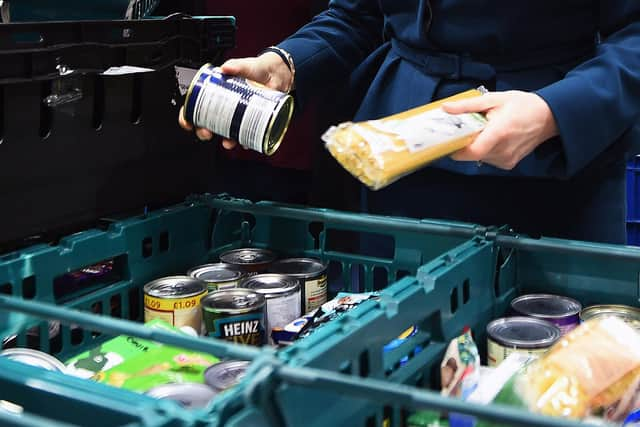Number of Scots in poverty rises to highest level for two decades at 1.1m
Scottish Government data shows that over the period 2019 to 2022, there were 1,110,000 people across the country living in relative poverty – meaning the amount of money they have is less than 60% of UK median income after housing costs are taken into consideration.
That is up from 1,030,000 in the period 2018 to 2021, and is the highest number of people in poverty since 2000 to 2003, when the total was 1,140,000.
Advertisement
Hide AdAdvertisement
Hide AdThe latest data shows 250,000 – almost one in four (24%) – youngsters were living in relative poverty, with this total said to be the equivalent of 10,000 primary school classes of children.


Of these, more than two-thirds (69%) were living in households where at least one person was in work.
Legally binding targets passed by Holyrood commit ministers to reducing the number of children in relative poverty in Scotland to 18% by next year – before reducing this further to less than 10% by 2030.
John Dickie, director of the Child Poverty Action Group (CPAG) in Scotland, said: “In a rich country these scandalous levels of child poverty are utterly unacceptable and a stark reminder how vital the Scottish Government’s focus on child poverty is.”
As Nicola Sturgeon steps down as First Minister, he called on Scotland’s next leader to increase “crucial investment” in the Scottish Child Payment – which currently pays out £25 a week per child to eligible low-income families.
Mr Dickie said: “It’s children that pay the highest possible price for poverty – they pay with their health, their wellbeing and their life chances.”
Philip Whyte, director of the IPPR Scotland think tank, said Scotland was “barely making a dent in our persistently high child poverty rate”.
He added: “Although important, targets almost a decade away mean little when a quarter of a million children are locked in poverty right now and progress has stagnated.
Advertisement
Hide AdAdvertisement
Hide Ad“These figures should be a warning that we need to go further, faster with all the tools at our disposal.”
The latest figures cover the period 2019 to 2022 – with the Scottish Government pointing out that Covid had a “significant economic impact” during this time, along with the “devastating impact of the UK Government’s decade of austerity”.
The figures show 710,000 working-age adults were living in relative poverty in 2019 to 2022 after housing costs – which is 21% of this part of the population – as well as 15% of pensioners, meaning 150,000 elderly Scots are struggling to get by.
Jamie Livingstone, the head of Oxfam Scotland, said the “disturbing” new statistics show “the pandemic and cost-of-living crisis have dealt a devastating double blow to those on the lowest incomes”.
He added: “The UK Government must act, but the next first minister must do so too.
“They should acknowledge that tackling poverty requires greater action to narrow the yawning gap between rich and poor and use all of the powers at their disposal to do more than just tweak tax.
“Instead, they should introduce bold, progressive taxation, including targeting wealth.
“Only then will they end the deep injustice of poverty for good and build a fairer future for all of us.”
Advertisement
Hide AdAdvertisement
Hide AdSocial Justice Secretary Shona Robison said “too many people are living in poverty”, as she stressed ministers have “committed to break the cycle of poverty in Scotland within the scope of our powers and budget”.
She said: “Levels of poverty have fallen less than we would have hoped, given the Scottish Government’s significant investment.
“However these figures cover the period when the Covid-19 pandemic was having a significant economic impact and progress has also been hindered by the devastating impact of the UK Government’s decade of austerity and its welfare cuts for many Scottish families.
“In this financial year we have allocated almost £3 billion to a range of measures which will help mitigate the impacts of the cost-of-living crisis on households, with £1 billion of this only available in Scotland.
“As well as the game-changing Scottish Child Payment, we support families in a variety of ways, including free childcare, free bus travel for under-22s, free school meals to around 145,000 pupils, and we have made significant increases to both our fuel and food insecurity funds and have also made £2.5 million available to local authorities to boost the Scottish Welfare Fund.
“We will continue to use all the powers and resources available to us to provide immediate support to families and to tackle the underlying causes of poverty whilst seeking more powers so we can use all the levers we need to enable us to truly tackle poverty.”